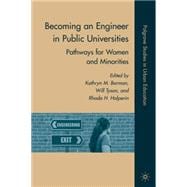
Note: Supplemental materials are not guaranteed with Rental or Used book purchases.
Purchase Benefits
Looking to rent a book? Rent Becoming an Engineer in Public Universities Pathways for Women and Minorities [ISBN: 9780230619357] for the semester, quarter, and short term or search our site for other textbooks by Borman, Kathryn M.; Halperin, Rhoda H.; Tyson, Will. Renting a textbook can save you up to 90% from the cost of buying.
Kathryn M. Borman is Professor of Anthropology and lead researcher at the Alliance for Applied Research in Anthropology and Education, Department of Anthropology, University of South Florida. Her program of research has focused on urban school districts with high levels of minority students, implementing a science professional development program for elementary teachers to increase science achievement, and understanding STEM pathways to post-secondary education. Upcoming research includes projects funded by the National Science Foundation, the Department of Education and the Spencer Foundation. While at USF, Dr. Borman founded the International Journal of Educational Policy, Research and Practice and is a collaborator and editor of several recent books, including Sociological Perspectives on No Child Left Behind (with Alan Sodovnik and Jennifer O’Day), Examining Comprehensive School Reform (with Daniel Aladjem), The Encyclopedia of the High School (with Spencer Cahill and Bridget Cotner), Education Politics and Policy in Florida (with Sherman Dorn and Associates), and Meaningful Urban Education Reform: Confronting the Learning Crisis in Mathematics and Science.
Will Tyson Assistant Professor of Sociology and senior research associate at the Alliance for Applied Research in Anthropology and Education, Department of Anthropology, University of South Florida. He has a PhD in Sociology and a graduate certificate in Women’s Studies from Duke University and a BA in Sociology and Psychology from Wake Forest University. He came to the University of South Florida in 2004 as an NSF Post-Doctoral Research Associate and joined USF Sociology in 2005. His research interests include high school science and mathematics course taking and factors that lead students into STEM degree attainment and careers and structural factors that enhance interracial contact and lead to interracial friendships.
Rhoda Halperin received her BA in Economics from Bennington College and a PhD in Anthropology from Brandeis University. Most recently, Dr. Halperin was Professor of Anthropology at Montclair State University and was Professor Emerita in the Department of Anthropology, University of Cincinnati. She was the author of numerous books and articles on economic and urban anthropology as well as gender, youth, and education. In 2006, Dr. Halperin became a Fellow of the Society for Applied Anthropology, recognizing her work on urban development, education, and the theory and practice of community heritage. Her most recent book, Whose School is It? Women, Children, Memory and Practice in the City (2006), documents the creation and implementation of a community heritage school in a diverse working class community in Cincinnati, Ohio. Her other research interests included: relationships between theory and practice in urban anthropology, gender and power, medical anthropology and cultural competency, and history and contemporary anthropological theory.
| List of Figures | p. ix |
| Acknowledgment | p. xi |
| Series Editors' Foreword | p. xiii |
| Introduction: The Scarcity of Scientists and Engineers, a Hidden Crisis in the United States | p. 1 |
| Producing STEM Graduates in Florida: Understanding the Florida Context | p. 21 |
| To Stay or to Switch? Why Students Leave Engineering Programs | p. 53 |
| Pedagogy and Preparation: Learning to be an Engineer | p. 81 |
| Program Climate: Engineering Social and Academic Fit | p. 105 |
| Program Culture: How Departmental Values Facilitate Program Efficacy | p. 127 |
| Making the Transition: The Two-to Four-Year Institution Transfer Experience | p. 147 |
| Voices from the Field: Strategies for Enhancing Engineering Programs | p. 173 |
| References | p. 191 |
| List of Contributors | p. 199 |
| Index | p. 203 |
| Table of Contents provided by Ingram. All Rights Reserved. |
The New copy of this book will include any supplemental materials advertised. Please check the title of the book to determine if it should include any access cards, study guides, lab manuals, CDs, etc.
The Used, Rental and eBook copies of this book are not guaranteed to include any supplemental materials. Typically, only the book itself is included. This is true even if the title states it includes any access cards, study guides, lab manuals, CDs, etc.